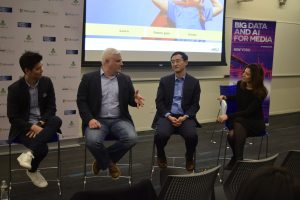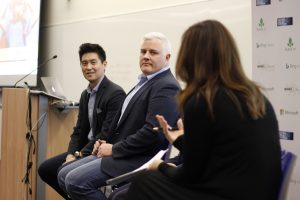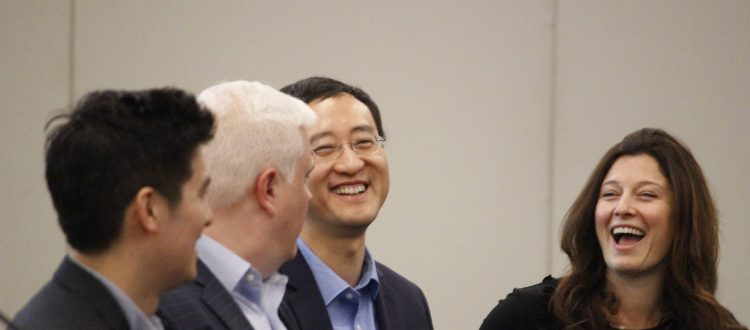Panel discussion: What’s next for the data-driven advertising business
By Ethan Wagner, Columbia University

Kenneth Suh, COO of Unruly, opened the panel discussion with a scenario that pleases users and advertisers alike. Say that you are in the shower and realize that you are out of shampoo. For households that have a voice-activated AI product like Amazon’s Alexa or Google Home, imagine simply saying “More shampoo.” The AI would be smart enough not only to schedule an immediate order, but also to know that you are loyal to a particular brand, say Head and Shoulders, and have learned the particular kind of shampoo you want without any need for you to specify.

Ting Cai, Director of Bing News at Microsoft, noted that the benefits of such personalization also had a negative side. In providing news to users, he said, he must remain attuned to the problem of unintentionally creating an echo chamber. Bing has learned that professionals want their daily news rundown to be brief, to catch up in a minimum amount of time—the challenge then, he said, was how to give them what they want, which could reinforce the echo chamber, while also exposing them to seemingly unrelated interests.
“We can tell who wants to go wide and who wants to go deep,” he said, and noted that Bing has tried to tailor its news recommendations accordingly to match the intellectual curiosity of a wide range of users.
Tobias Bennett of LMC agreed with the pitfalls of over-personalization. “In news, there needs to be a concerted effort to put information in front of people that they’re not necessarily looking for at the outset,” he said. “We want to make our news sites stickier while avoiding the echo chamber effect, but unfortunately there are no easy answers. There’s no incentive for publishers to get new information in front of people. If anything, the incentive runs in the opposite direction, to keep telling them what they want to hear, which reinforces what they’re looking for and makes them feel good about themselves and their worldview.”
Continuing, Bennett remarked that a change may any impetus to change may need to come from non-profits or privately held companies. Publicly held companies, he said, will chase the dollar because they have no choice. “Behavior doesn’t change until it absolutely has to—we won’t see a revolution that changes the way our society functions until people can no longer get a cheeseburger for a dollar.”
Suh found reason for optimism, observing that many firms in the tech space have put a heavy focus on cleaning up bad actors and clickbait-mongers. He highlighted the shift away from cookies and toward new identifiers, which many competitors are experimenting with that will usher in a new and improved era of personalization.
For he and his firm, Suh said, explicit consent is of the utmost importance, a principle underscored more than ever by the revelations concerning Cambridge Analytica and Facebook in recent days. Unruly emphasizes first-party (meaning users themselves) rather than third party access to data along with contextual targeting. This emphasis on transparency is critical to gaining users trust and making clear which data is being collected and by whom.

The potential downside, Suh said, is that it will place additional pressure on news publishers who want to fund high-quality content. If users are asked directly to opt in to have their data collected and reject such requests, the advertising model that sustains most news outlets becomes inoperative.
Bennett predicted that it would take a landmark event, “something that makes the Equifax or Cambridge Analytica breaches look ‘cute,’” he said, before the public would wake up to how their data is being used and demand change. In the US context, he continued, that will probably require legislation that protects and regulates collection and use of digital data. “Until then, most people will be happy with their free content.”

Ting agreed that Bing has witnessed users becoming more cautious in what information they divulge. In response, he said, firms need to cease collecting superfluous data and focus on what truly adds value. “Give users control of their own data so they can leverage it and participate actively in the exchanges we are asking them to have,” he said.
Bennett said that such change and regulation was inevitable, however. “Your digital ID is the most vital personal information that people have, it will become just as valuable and important as your social security number as we move forward into the future.”


